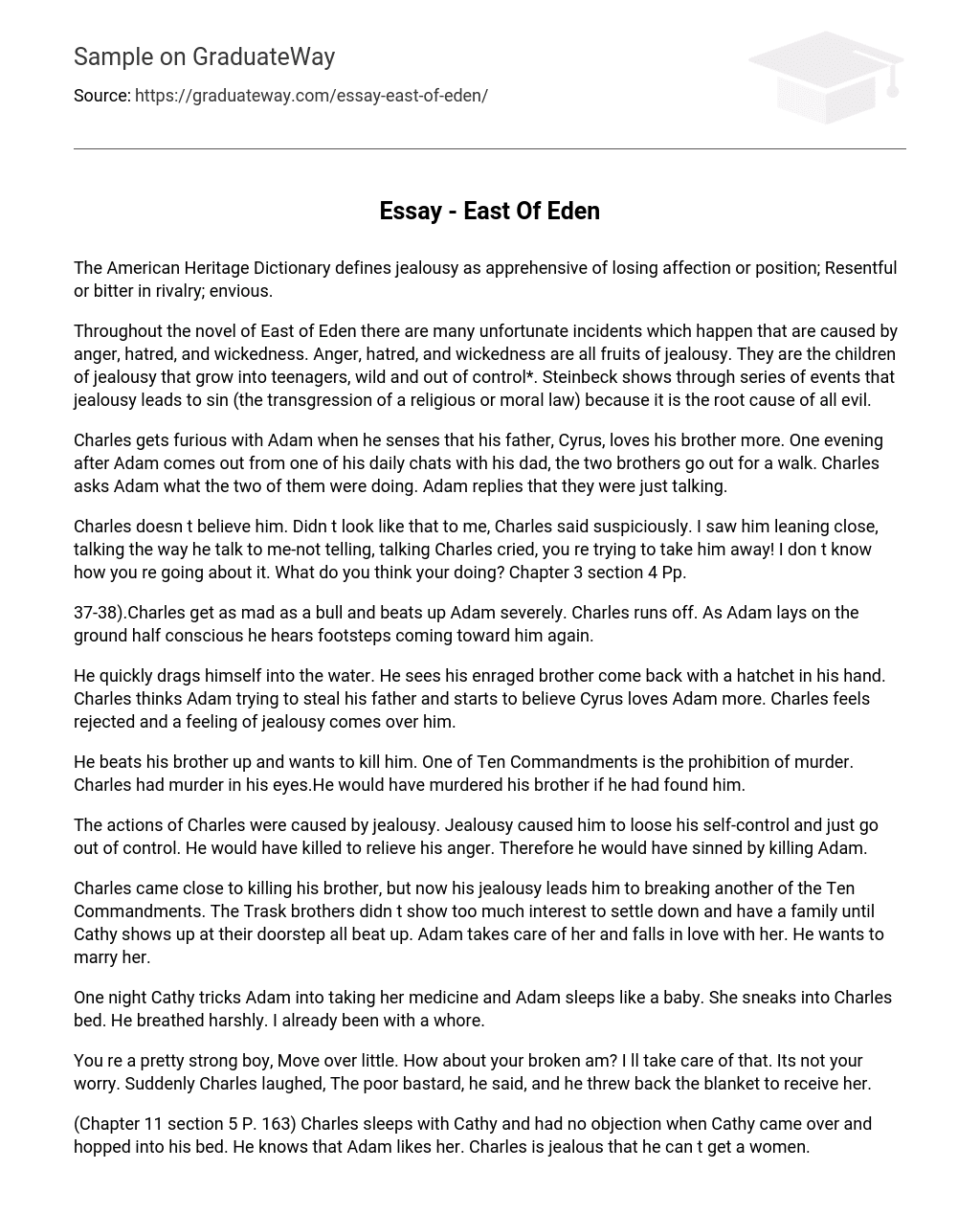Jealousy is defined by The American Heritage Dictionary as the fear of losing affection or position, accompanied by feelings of resentment and bitterness in rivalry and envy.
The novel East of Eden depicts a series of unfortunate events that arise from anger, hatred, and wickedness. These negative emotions originate from jealousy, which gives rise to rebellious and uncontrollable behaviors*. Steinbeck presents how jealousy ultimately leads to sin (the transgression of religious or moral principles) as it serves as the fundamental root of all evil.
Charles becomes angry with Adam when he perceives his father, Cyrus, favoring his brother more. After Adam finishes one of his regular conversations with their dad, the two brothers take a walk together. Charles questions Adam about their activities, to which Adam responds that they were simply talking.
Charles is skeptical and confronts the other person, stating that it didn’t appear the same way to him. Charles suspects that they were having a secretive conversation and accuses them of attempting to separate him from someone else. Charles expresses confusion and asks them what their intentions are. This occurred in Chapter 3, section 4, on page 49.
Charles becomes extremely angry and attacks Adam violently, leaving him severely injured. Charles then flees the scene. While Adam is lying on the ground, barely conscious, he hears someone approaching him once more.
He swiftly pulls himself into the water, glimpsing his furious brother returning with a hatchet. Charles assumes Adam is attempting to take away their father, leading him to suspect that Cyrus favors Adam more. Charles experiences a sense of rejection and becomes consumed by jealousy.
He is physically violent towards his brother and desires to end his life. The prohibition of murder is one of the Ten Commandments. Charles displays intense hostility towards his brother, expressing a strong inclination to commit murder if he were to locate him.
Charles’s jealousy drove him to lose control of himself, becoming uncontrollable. He was prepared to go to the extreme of killing in order to relieve his anger, a sin that would have resulted in him taking Adam’s life.
Charles almost killed his brother but now his envy prompts him to break another of the Ten Commandments. The Trask brothers lacked interest in settling down and starting a family until Cathy arrives at their house, battered and bruised. Adam tends to her and falls in love with her, desiring to wed her.
One evening, Cathy deceitfully convinces Adam to consume her medication, resulting in him experiencing a peaceful sleep. Later, she secretly enters Charles’ bed, noticing his heavy breathing as he confesses to previously being intimate with a prostitute.
“You’re a pretty strong boy,” Charles said, motioning for the little one to move over. “How about your broken arm? I’ll take care of that. It’s not your worry.” Suddenly, Charles burst into laughter. “The poor bastard,” he exclaimed, as he threw back the blanket to embrace her.
(Chapter 11 section 5 P. 163) Charles allows Cathy to sleep beside him, despite knowing that Adam is attracted to her. Charles harbors jealousy towards his own inability to attract women.
Jealousy leads to sin as evidenced by his actions. Despite the commandments prohibiting adultery and coveting a neighbor’s wife, he slept with his brother’s soon-to-be wife, resulting in him committing two sins.
While Charles’s jealousy nearly leads to the death of his brother and betrays him, Cal indirectly causes the death of his brother. Cal desires to pleasantly surprise his father, Adam, by bestowing him with a gift of $15,000 that he had invested. His excitement about this is palpable as he anxiously awaits Thanksgiving.
Thanksgiving finally comes and Cal hands over the $15,000 to his father. However, much to Cal’s astonishment, Adam declines to take the money and tells him to give it back. This refusal deeply wounds Cal and he becomes so enraged that he decides to burn the $15,000. Struggling with intense emotional agony, Cal eventually confides in his brother about their mother’s real identity.
Aron is shocked and overwhelmed, causing him to join the army where he ultimately dies. Upon learning of his son’s death, Adam becomes devastated and falls seriously ill. It is during this time that Cal confesses his wrongdoings to his father.
Adam, in a fit of rage, believed that you had rejected him and committed a harmful act as a result. This anger tragically resulted in the death of his brother, who is also your son. This incident can be found in Chapter 55, Section 3, page C. It is worth mentioning that Cal expressed his love for his father by giving him money.
Adam’s lack of acceptance causes Cal to feel rejected, as he believes he is not loved as much as his more accomplished brother. This leads to jealousy, as Cal understands that his brother cannot handle the truth about their mother’s identity.
He reveals the truth about his mother to his brother, causing his jealousy to intensify into anger and ultimately manifesting as harmful actions. Stienbeck highlights how jealousy serves as a catalyst for evil deeds committed by individuals. Thus, jealousy frequently gives rise to various malicious acts.
Sins, such as adultery, murder, stealing, and lying, are all examples of acts that are considered sin. Jealousy is not confined to the story’s time period but remains prevalent in our present-day society. People encounter jealousy daily.
Jealousy may arise when someone possesses more wealth or intelligence than oneself, potentially leading to impaired judgment and uncontrollable anger. This emotional state can further escalate into engaging in malicious behavior.
By controlling and not allowing jealousy to dominate us, we possess the capacity to overcome sin.





